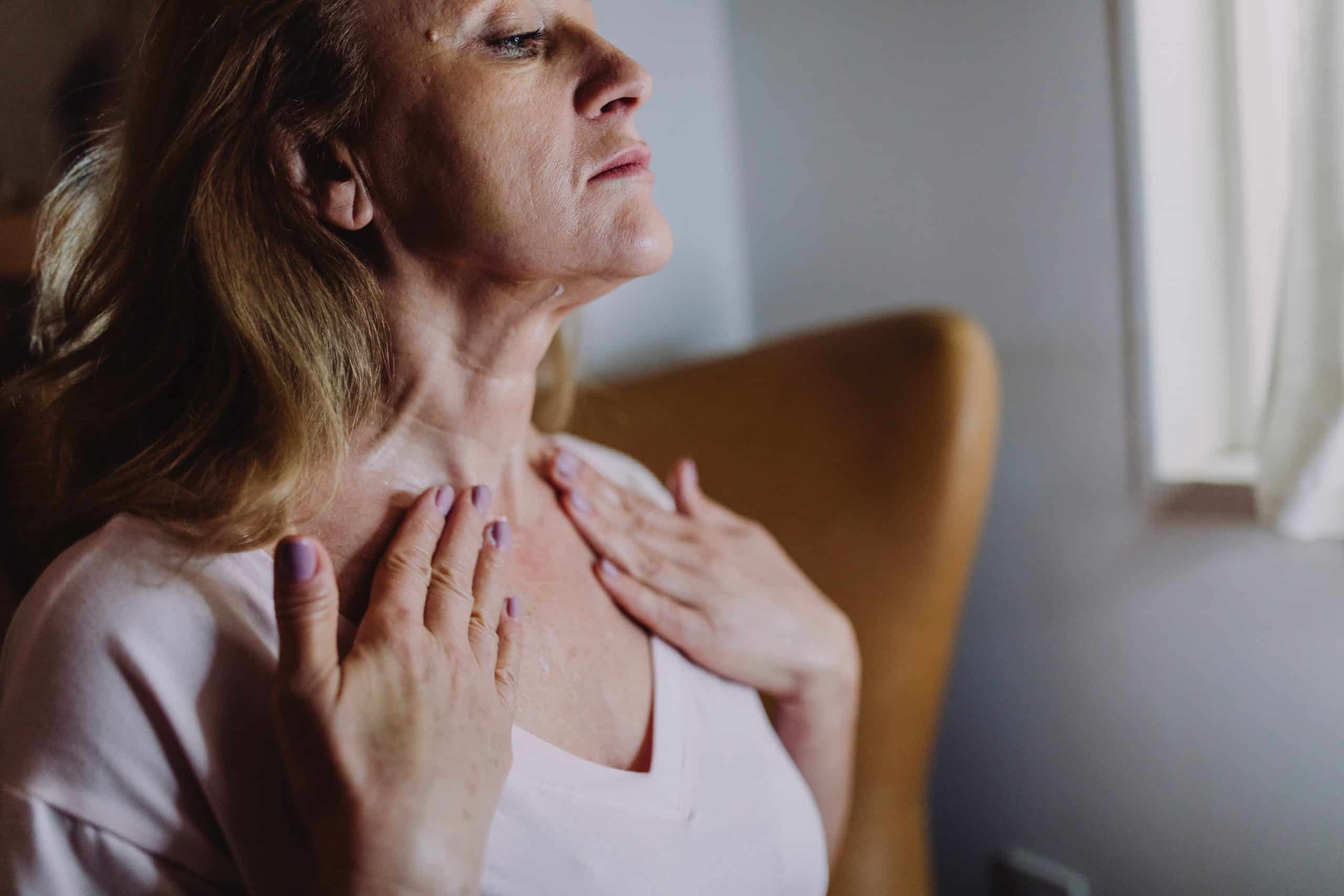It may be true that most women aren’t looking forward to [linkbuilder id=”5141″ text=”menopause”], but it is a natural part of growing older as a woman. Menopause isn’t a sign that something’s wrong. In fact, it is more of a clue the body is doing what’s right for it by following the natural order of things.  Menopause is most easily understood as the time in a woman’s life when she stops having a menstrual cycle. Since many women may experience some level of irregularity with their cycles as they grow older, most experts suggest waiting a full 12 months after the last menstrual cycle before officially declaring a woman has reached menopause.
Menopause is most easily understood as the time in a woman’s life when she stops having a menstrual cycle. Since many women may experience some level of irregularity with their cycles as they grow older, most experts suggest waiting a full 12 months after the last menstrual cycle before officially declaring a woman has reached menopause.  Of course, there is much more to menopause than the end of your periods. This phase in a woman’s life is marked by a lot of changes. For most women, the symptoms of growing older and transitioning into menopause begin long before their last menstrual cycle. Even though there are some commonly expected symptoms, the menopausal experience is different for each woman. Some women may experience little to no frustrating symptoms, whereas others experience frequent hot flashes, weight gain, sleeplessness, mood swings, and more.
Of course, there is much more to menopause than the end of your periods. This phase in a woman’s life is marked by a lot of changes. For most women, the symptoms of growing older and transitioning into menopause begin long before their last menstrual cycle. Even though there are some commonly expected symptoms, the menopausal experience is different for each woman. Some women may experience little to no frustrating symptoms, whereas others experience frequent hot flashes, weight gain, sleeplessness, mood swings, and more.  This can make it difficult to know what you should expect as you grow older. For some, previously unheard of symptoms might make them wonder if their experience is healthy or normal. Continue reading for a detailed look at what to expect from menopause and advice on how you can care for yourself during this season of your life.
This can make it difficult to know what you should expect as you grow older. For some, previously unheard of symptoms might make them wonder if their experience is healthy or normal. Continue reading for a detailed look at what to expect from menopause and advice on how you can care for yourself during this season of your life.
What are the stages of menopause?
Typically, women experience menopause in stages. For roughly 60 percent of women, the earliest symptoms of menopause begin in their mid-forties. This stage is known as perimenopause, or the menopausal transition. The symptoms associated with this stage typically last seven years, according to the National Institute on Aging (NIA).  The symptoms of perimenopause are caused by naturally occurring fluctuations in a woman’s estrogen and progesterone hormones as she enters middle age. Just like menopause, the perimenopausal experience can vary greatly from woman to woman. Some women report not noticing any symptoms until their cycles begin to change just before they enter full-blown menopause. Others have a more difficult time and may struggle to cope with the symptoms of impending menopause as soon as their early forties.
The symptoms of perimenopause are caused by naturally occurring fluctuations in a woman’s estrogen and progesterone hormones as she enters middle age. Just like menopause, the perimenopausal experience can vary greatly from woman to woman. Some women report not noticing any symptoms until their cycles begin to change just before they enter full-blown menopause. Others have a more difficult time and may struggle to cope with the symptoms of impending menopause as soon as their early forties.  Although many women identify their entire aging experience as the start of menopause, strictly speaking, any aging-related experiences that occur before a woman’s final period are part of perimenopause, not menopause itself. For instance, many women will have symptoms associated with the changing hormone levels in their bodies long before menopause takes place. Menopause is the second stage that aging women can expect and officially occurs once they have gone without a period for a full 12 months.
Although many women identify their entire aging experience as the start of menopause, strictly speaking, any aging-related experiences that occur before a woman’s final period are part of perimenopause, not menopause itself. For instance, many women will have symptoms associated with the changing hormone levels in their bodies long before menopause takes place. Menopause is the second stage that aging women can expect and officially occurs once they have gone without a period for a full 12 months.
What are the symptoms of perimenopause and menopause?
As women age, they can expect to experience a wide variety of symptoms caused by changing hormones. Both perimenopause and menopause are characterized by uncomfortable hot flashes. Many women will also experience changes to their libido at this time.  Some may notice they are prone to vaginal dryness or start experiencing more frequent vaginal infections, according to the NIA. Additionally, women who are in menopausal transition often report difficulty sleeping. Progesterone, one of the hormones that’s known for inducing feelings of sleepiness, decreases as menopause nears. As progesterone levels drop, women may experience increased restlessness or anxiety at night that makes it hard to sleep.
Some may notice they are prone to vaginal dryness or start experiencing more frequent vaginal infections, according to the NIA. Additionally, women who are in menopausal transition often report difficulty sleeping. Progesterone, one of the hormones that’s known for inducing feelings of sleepiness, decreases as menopause nears. As progesterone levels drop, women may experience increased restlessness or anxiety at night that makes it hard to sleep.  Women may also notice harder-to-define indications that their bodies are changing, like difficulty losing weight, changes to their mental clarity, or increased muscle and joint pain. These symptoms are just some of the most common. There are many less common symptoms experienced by women in perimenopause and menopause, so don’t be alarmed if you experience something not outlined here.
Women may also notice harder-to-define indications that their bodies are changing, like difficulty losing weight, changes to their mental clarity, or increased muscle and joint pain. These symptoms are just some of the most common. There are many less common symptoms experienced by women in perimenopause and menopause, so don’t be alarmed if you experience something not outlined here.  Of course, your doctor can advise you as to whether what you are noticing about your body is within a normal range. They can also provide guidance when it comes to easing the discomfort of less-than-pleasant symptoms you’re experiencing.
Of course, your doctor can advise you as to whether what you are noticing about your body is within a normal range. They can also provide guidance when it comes to easing the discomfort of less-than-pleasant symptoms you’re experiencing.
How Your Body Changes During Menopause
Check out the video below to see what biological changes to expect during menopause:
How to Take Care of Your Aging Body
All aging women should spend time carefully considering the status of their health to determine whether changes need to be made in how they’re caring for their bodies. Since postmenopausal women are more likely to experience osteoporosis, it is important make sure you are consuming plenty of calcium and vitamin D. Excessive salt consumption and soda are known to contribute to bone weakness and should be avoided when possible.  No matter your risk factors for heart disease, it is recommended that all aging women adopt a heart-healthy diet full of leafy greens and foods high in omega-3s. Additionally, foods like red meats and high-fat dairy shouldn’t be consumed on a regular basis, as they have been found to contribute to cardiovascular disease.
No matter your risk factors for heart disease, it is recommended that all aging women adopt a heart-healthy diet full of leafy greens and foods high in omega-3s. Additionally, foods like red meats and high-fat dairy shouldn’t be consumed on a regular basis, as they have been found to contribute to cardiovascular disease.
Managing the Symptoms of Menopause
Growing older doesn’t have to be a burden, and menopause certainly shouldn’t be a reason to dread your next birthday.  There are many steps middle-aged women can take to manage the symptoms of menopause, affording themselves the opportunity to find as much enjoyment in their lives as possible during this new chapter. Women who are dealing with forgetfulness or loss of mental clarity should be sure they are getting adequate rest and plenty of exercise. Extreme forgetfulness or confusion is not a typical symptom of menopause, so anything that gives you reason to worry is a nudge to schedule a visit with your doctor.
There are many steps middle-aged women can take to manage the symptoms of menopause, affording themselves the opportunity to find as much enjoyment in their lives as possible during this new chapter. Women who are dealing with forgetfulness or loss of mental clarity should be sure they are getting adequate rest and plenty of exercise. Extreme forgetfulness or confusion is not a typical symptom of menopause, so anything that gives you reason to worry is a nudge to schedule a visit with your doctor.  When it comes to sleeplessness, be certain to practice good, sleep-prioritizing habits by sticking to a routine. Avoid exposure to screened devices right before bed, and stay active during the day. Also, as tempting as it might be, resist the urge to crawl in bed for an afternoon nap, as that can ultimately disrupt your sleep at night. Getting plenty of exercise and eating well during perimenopause and menopause will contribute to improving your overall mood, boosting your energy, and assisting in weight management as your metabolism begins to slow with age.
When it comes to sleeplessness, be certain to practice good, sleep-prioritizing habits by sticking to a routine. Avoid exposure to screened devices right before bed, and stay active during the day. Also, as tempting as it might be, resist the urge to crawl in bed for an afternoon nap, as that can ultimately disrupt your sleep at night. Getting plenty of exercise and eating well during perimenopause and menopause will contribute to improving your overall mood, boosting your energy, and assisting in weight management as your metabolism begins to slow with age.  Still, know that for some women, at-home remedies simply aren’t enough. If you feel your symptoms are extreme, it isn’t a bad idea to visit with your doctor to discuss the options available for making you more comfortable. Some doctors may recommend hormone replacement therapy, whereas others will suggest less invasive options for improving your overall wellness as you enter menopause.
Still, know that for some women, at-home remedies simply aren’t enough. If you feel your symptoms are extreme, it isn’t a bad idea to visit with your doctor to discuss the options available for making you more comfortable. Some doctors may recommend hormone replacement therapy, whereas others will suggest less invasive options for improving your overall wellness as you enter menopause.



